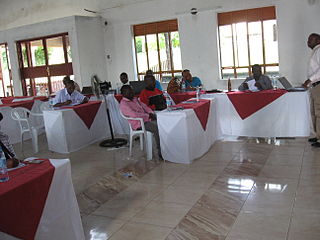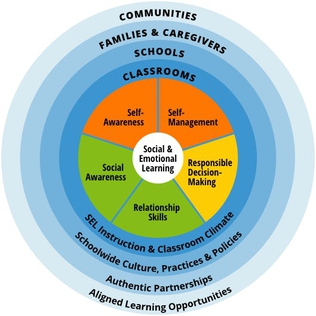 W
WEducation is the process of facilitating learning, or the acquisition of knowledge, skills, values, morals, beliefs, habits, and personal development. Educational methods include teaching, training, storytelling, discussion and directed research. Education frequently takes place under the guidance of educators; however, learners can also educate themselves. Education can take place in formal or informal settings, and any experience that has a formative effect on the way one thinks, feels, or acts may be considered educational. The methodology of teaching is called pedagogy.
 W
WAbility grouping is the educational practice of grouping students by potential or past achievement for a relevant activity. Ability groups are usually small, informal groups formed within a single classroom. It differs from tracking by being less pervasive, involving much smaller groups, and by being more flexible and informal.
 W
WA blue-collar scholar or blue-collar academic is a person who comes from a family or background of blue-collar workers who enters into the study and training of higher education as an undergraduate student or is an academician doing scholarly work to make their professional living. A common term used in understanding student who come from working class, or blue-collar families, is a first-generation college student. These students are the first in their immediate family to attend a college or university. There are social impacts and struggles for students in higher-education who come from working-class families.
 W
WComposition studies is the professional field of writing, research, and instruction, focusing especially on writing at the college level in the United States. The flagship national organization for this field is the Conference on College Composition and Communication.
 W
WEducation for sustainable development (ESD) is defined as education that encourages changes in knowledge, skills, values and attitudes to enable a more sustainable and just society for all. ESD aims to empower and equip current and future generations to meet their needs using a balanced and integrated approach to the economic, social and environmental dimensions of sustainable development. ESD is the term most used internationally and by the United Nations.
 W
WLarge-scale learning assessments (LSLAs) is defined as a form of national or cross-national standardized testing that provide a snapshot of learning achievement for a group of learners in a given year and in a limited number of learning domains.
 W
WReconciliation education is a teaching-learning framework for improving participants' attitudes toward other groups of people, developed in Australia by Adam Heaton.
 W
WThe right to education has been recognized as a human right in a number of international conventions, including the International Covenant on Economic, Social and Cultural Rights which recognizes a right to free, compulsory primary education for all, an obligation to develop secondary education accessible to all, in particular by the progressive introduction of free secondary education, as well as an obligation to develop equitable access to higher education, ideally by the progressive introduction of free higher education. In 2021, 171 states were parties to the Covenant.
 W
WSeliger is an educational forum (camp) held since 2005 at Lake Seliger in the Russian Tver Region.
 W
WSocial-emotional learning (SEL) is an education practice that integrates social and emotional skills into school curriculum. SEL is also referred to as "socio-emotional learning", "social and emotional learning", or "social-emotional literacy". In practice, social-emotional learning emphasizes social and emotional skills to the same degree as other subjects, such as math, science, and reading.
 W
WThe sociology of education is the study of how public institutions and individual experiences affect education and its outcomes. It is mostly concerned with the public schooling systems of modern industrial societies, including the expansion of higher, further, adult, and continuing education.
 W
WA teaching script is a sample script that serves as a visual orientation for learning to write by hand. In the sense of a guideline or a prototype, it supports the demanding process of developing handwriting skills and abilities in a visual and illustrative way.
 W
WA yearbook, also known as an annual, is a type of a book published annually. One use is to record, highlight, and commemorate the past year of a school. The term also refers to a book of statistics or facts published annually. A yearbook often has an overarching theme that is present throughout the entire book.